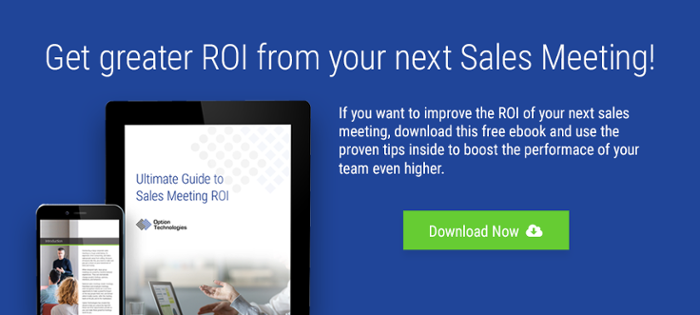Do your sales meetings contribute to positive ROI? If you’re not sure, you might be missing opportunities to collect crucial data. Information from your team allows you to analyze performance and assess learning levels that are affecting your sales numbers.
Let’s take a closer look at a case study that highlights the connection between team feedback and ROI, and shows the important role of data collection.
ROI Institute Case Study: Fashion Stores
The ROI Institute, a world leader in resource analysis and research methodology, worked with one of the world’s top fashion retailers to boost ROI and determine factors that were inhibiting growth. For privacy reasons, the retailer was identified as Fashion Stores Incorporated (FSI) in the study. FSI has stores in 50 countries and more than 100,000 employees.
Together, The ROI Institute and FSI developed 10 core competencies required of all managers and team members in order to maintain an in-store culture of high performance.
- Identifying opportunities for improvements
- Addressing challenges and roadblocks
- Building trust and confidence
- Setting clear goals and expectations
- Managing conflicts and differences
- Recognizing and rewarding team members
- Improving average performers
- Fostering open and clear communications
- Providing feedback and support
- Action planning, reflecting, and adjusting
Of course, not every manager and staff member had all 10 competencies - and FSI couldn’t pull them away from day-to-day work for weeks of education. So a training plan was developed that would work at each retail location, within workers’ available hours.
The program consisted of a variety of channels, including e-learning modules, a learning portal, classroom education, coaching support, and interactive feedback. Learning modules were mostly 30-minute computer-based individual sessions, and classroom learning was in two-hour group seminars or two-day workshops. Individual coaching, with 360-degree feedback, was built into the process.
Each FSI employee experienced a guided process through stages of learning, including: awareness, decision to improve, feedback, making adjustments, skills, engagement, reflection, planning, connecting, implementation, review, reporting and sharing. A total of 93 participants took part in the initial program, and FSI expanded it to 4,000 managers after seeing initial success. Surveys of participants showed above-average ratings, particularly on whether they intended to use the program’s information in their day-to-day work - rated 4.7 out of 5 stars.
Seeing Real ROI
The FSI study’s employee survey results were impressive, but did their education efforts really improve ROI? In a word, yes.
Each manager who participated in the learning program was asked to identify two key measures of improvement - primarily upsells, cross-sells, increasing sales among existing customers, enticing new customers, profit margin, expense control, and shrinkage (theft) control. Managers were expected to implement what they learned from the program, improve on their two key measures, and gather feedback and data from their team along the way.
FSI assigned monetary values to each of the measures - for example, a single new account was valued at $745. This allowed them to calculate the first-year value of each manager’s improved performance. Are you ready for the final company-wide dollar value of the FSI performance program?
It was a staggering $1,341,970. FSI spent $576,865 implementing the program, a cost that was expected to decline proportionally over time, after the initial investment.
Analysis of Case Study
What can your organization learn from the FSI case study? Here are some key takeaways.
1- Success lies in structured learning. You’re not going to find a million dollars in the little tips and informal training that commonly happens among sales staff. Consider a structured education program from a professional training company, like FSI did.
2- Feedback is essential. At all levels of the FSI process, feedback was openly encouraged - prior to starting, during the courses, and especially in the ROI measurement stage. Data collection during your sales meetings creates an interactive environment where real, actionable numbers are an everyday part of the discussion. Seek software that allows easy data gathering.
3- Measure carefully. The ROI Institute helped FSI develop specific measures of success, so they would know whether the program was really working. This can be a tricky process, so make sure you partner with a reputable education company and software provider that uses cutting-edge data collection and methodology.
Change your meetings. Change your world. Option Technologies can help you take your sales meetings and staff training to a new - and more profitable - level.


